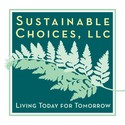 As the Fall season of 2010 is starting, consider your sustainable choices, and your connections to your community.
As the Fall season of 2010 is starting, consider your sustainable choices, and your connections to your community.
Increase to two best habits, and let two unsustainable habits fall by the wayside. For instance, I’m choosing to drink more water, eat more vegetarian meals, eat less sugar and to connect face-to-face rather than only over the internet.
I’m excited to hear that more municipalities are recycling plastics #3 to #7, as well as #1 and #2.
I discovered that shredded paper is not helpful to the recycling process, so I’m considering increasing the amount of craft paper that I make in order to use the shredded paper we produce. Another option is to add the shredded paper to our compost.
My work as a consultant to the Philadelphia Water Department is extremely exciting and rewarding. The enviroscape watershed model is a great stimulus for watershed information. At public events (see the calendar) and with classes at schools, the visual polluting of the water is dramatic.
My frequent talking points are:
- rainwater goes down storm drains on the street,
- pick up after your dog,
- clean land makes clean water.
There are multiple free educational opportunities via the Philadelphia Water Department. Contact me if you want to increase your school’s watershed education, either in the classroom or with field trips to PWD locations.
Sustainable Choices is also expanding in other ways. The Montessori School (TMS) in Dresher, PA is increasing outdoor explorations of their property, and the township park beside TMS with be provided with consulting services and education. The House at Pooh Corner is increasing science exploration in its preschool class. Both schools are excellent matches between my skills and their specific requests. The opportunity to work with exceptional teachers who want support in developing their scientific skills is also very rewarding.
The third area of expansion and exploration with Sustainable Choices is with Birthday Parties or “one time” events. I look forward to a fall birthday party this coming weekend, and wonder how to expand this potential educational opportunity. What a joy it is to encourage appropriate nature exploration in local parks.
It’s going to be a great year!
Dottie